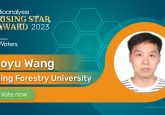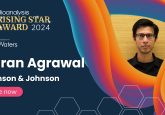Bioanalysis Rising Star Award finalist: Amanda Smythers
Nominated by: Benjamin Orsburn, Assistant Professor at the University of Pittsburgh Organ Pathobiology and Therapeutics Institute (PA, USA)
Supporting comments:
“This young scientist checks all the boxes for this award. Amanda is a force in the lab thanks to a remarkable work ethic and organizational skills. She is also a gifted mentor as supported by her graduate work, which has been featured by CNN and Science News, and which leveraged undergraduates that she mentored through the pandemic. Today she is a postdoctoral fellow at Harvard where she has already contributed to work published in Cell Metabolism – as well as accepted work in Annual Reviews of Pathology – easily two of the most prestigious journals in bioanalysis. She recently served as an organizer for the US Human Proteomics Organization annual meeting – where she was seemingly everywhere filling in for government scientists who couldn’t attend. This was in addition to other responsibilities and her own main stage presentation. I’ve never seen a postdoctoral fellow with the ability to operate as an independent researcher and collaborator at this career stage. Her advisors have been rewarded for allowing this freedom as Amanda has recently secured an award to continue to further develop her own independent research in cancer biology. I’m out of words, but I couldn’t and wouldn’t recommend anyone more.”
Describe the main highlights of your bioanalytical work
My work since graduate school has focused on interrogating signaling mechanisms in biological systems through the implementation of mass spectrometry. This has encompassed discovery and quantitative analysis of post-translational modifications, protein-protein interactions, and protein-dependent interorgan signaling. In graduate school, I led our investigation on tardigrades to uncover a cysteine-oxidation specific mechanism of survival through the implementation of mass spectrometry, confocal fluorescent microscopy and electron paramagnetic spectroscopy. As a postdoctoral fellow, I work at the interface of discovery and translational research, where I implement mass spectrometry to uncover the mechanism(s) governing novel treatments for Parkinson’s disease and melanoma. Simultaneously, I am using exercise as a platform for novel therapeutic discovery, where I am expanding our knowledge of organ- and exercise-dependent secreted protein networks. I evaluate exercise induced signaling proteins as candidates for new therapeutics using both cell biology and a variety of bioanalytical methods, including proteome integral solubility alteration assays, metabolomics and fluorescence-based approaches.
VIEW THE OTHER FINALIST PROFILES






